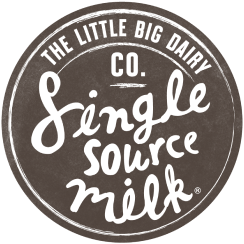A social media campaign urging people to buy locally produced milk has led to a minor spike in sales, but people need to be far more educated about where their food is coming from according to local milk producer Emma Elliott, a seventh generation dairy farmer who’s a director of Dubbo’s Little Big Dairy Company.
Reports that milk sales had gone through the roof seem to be premature, but retailers such as IGA supermarkets, who have embraced local milk producers, were looking to increase their stocking rates.
“This week we’ve had over 200 new ‘Likes’ on our Facebook page, we’ve got over 4,000 followers in two years – yes, that is awesome, it’s great because it helps us spread our message further but really if it translates to sales, that’s when it will make me feel heartened,” Elliott said.
“Really, there might have been a little bit of a step in our sales this week but it hasn’t been as drastic as Facebook, and I think that that’s just down to it’s easy to click ‘yes’, we’ll support that and this week you’re not going to buy Home Brand milk.”
“The test will be time and in NSW we really need the customer to tell the supermarkets that they want milk that they know is sustainable for the dairy industry because they want fresh milk.”
Coles yesterday posted an answer to a question on the company’s Facebook page that their ‘fresh’ milk , was in fact reconstituted from powdered milk.
The Facebook post, on the official Coles page, stated ‘We can confirm that Coles Brand Fresh milk is made from reconstituted milk powder.’
Coles has since deleted that Facebook post and retracted that statement, claiming ‘Unfortunately this was a human error as we left out the word NOT. Coles brand milk is NOT reconstituted milk powder. We hope this clears things up’.
What has many consumers angered is the duplicity from the supermarket duopoly, where profit is king and any marketing strategies are all about making money, not worrying about people.
Emma Elliott says the money generated by Little Big stays in the region, unlike the cut-price dollars buying generic supermarket milk.
“Between the farm and the factory 14 people are directly employed as staff on our farm, we buy all our purchasing from within 200 k’s of our farm, we buy a lot of hay and grain and silage.”
Multiply this story and the result is healthy local communities, socially, economically and environmentally. It’s how short and local supply chains used to work when people bought directly from local farmers or markets.
Supermarkets sell imported cut-price food, in part produced by cut-price labor working under appalling conditions, and with no heed to safety and environmental concerns (remember the berries), while all those profits from producing local food for local markets could create local wealth and good jobs instead of lining the pockets of remote-living multinational shareholders.
“One thing that bugs me is that the Australian population seems more than happy to import – Australians have amongst the best working conditions in the world for humans, we demand all these things like overtime, penalty rates, we lobby, we protest, we strike, we expect workers’ comp we expect all these things yet we are so happy to import food and products from other countries like China where they don’t even have working conditions for the people there,” Elliott said.
“We demand everything for ourselves yet we’re happy to buy it from somewhere else and not even think about it just because it’s cheaper.
“We have orange growers ripping out their orchards in central west NSW where the supermarket shelves are full of reconstituted orange juice imported from China for less than an Australian grower can even produce it, there’s definitely something wrong and we need to do something to fix this,” she said.
Both sides of politics say market forces will dictate who should remain in business, yet the federal government has allowed Coles and Woolworths to consume more than 70 percent of the national retail food market without creating fair market regulations to prevent them using market power and long term strategies to smash entire industries and small producers.
“People ask how supermarkets can sell milk if it’s not a fair price, they say how can they sell it at below cost and the fact is that milk is an essential item every family has in their fridge and they get you in their store to buy that cheap milk and while you’re there you pick up a few other things that have a higher margin on them like your soft drink and your confectionery, so that’s how they manage to do it,” Elliott said.
“Because it’s an essential they use it for a ‘loss leader’.
Mrs Elliott is saddened the Victorian situation had to hit rock-bottom and has gone through years of suicides and family distress before the public was woken up to the realities of cheap food.
“It’s a tragedy that things had to come to such a crisis situation to give farmers a voice,” she said.
“For years we’ve been trying to educate people on the dangers of buying cheap milk and how that impacts on the ability of the farmer to actually carry out his job producing high quality milk to the best of his ability,” she said.
The dairy industry is a deregulated market and the Victorian market is for export so they play on the world price but in NSW and QLD it’s produced for the domestic liquid drinking milk market so the milk produced in this state is going directly to domestic consumers via supermarkets.
Emma Elliott says there’s really no reason why consumers don’t have the power to vote for what they want, with their back pocket, the only language Coles and Woolies understand.
“There’s responsibility here – consumers are the ones demanding milk from healthy, happy cows that are grazing on fresh green grass, they put these demands on but obviously it costs so when they have these expectations they can’t expect that milk’s going to be available for a dollar a litre on the shelf,” Emma said.
“People know that when they do buy Little Big Dairy milk directly from our farm, our family, it’s single-source milk only from here which means that the integrity is guaranteed right through the supply chain from a trusted source and high quality source and they know that the money is going directly back into making the milk in a sustainable way where there’s a high level of animal welfare.
“Even when people buy branded milk, while it’s better for producers, those companies are still owned by foreign multinationals so I guess but locally, from people like us, I can tell you where this bottle has been and I can tell you that it’s got no milk powder in it, bottled on our farm and when you buy this, this is where your money’s going, what your money’s going in to and you can see that for yourself’ she said.”
Having spent her life growing up in a passionate dairying family, she’s travelled the country meeting others who share an interest in seeing the industry not only supplying quality products at fair prices, but also one that’s able to prosper.
“You don’t get out of bed at 3 o’clock in the morning unless you love it, unless you love cows so they’ve already been struggling to produce milk for the processors at the price they’re getting paid – to have their price dropped, and back-dated so they have to pay money back, it’s cruel and disgusting.”
“We’ve got a cattle stud and I’m 25 and have spent a lot of time with our dairy youth camps, dairy cattle shows and I have a lot of friends in the Victorian dairy industry and a lot of them are really crying out – the average age of dairy farmers is about 65 and so for young people who love it like we do and have it in their blood it’s devastating.”
“It’s devastating for someone to devalue that by telling you to tighten your belt buckle when you’ve already been doing that for years and you’ve been investing in technology and things to make yourself a more efficient farmer, yeah, it’s awful.”
Meantime, the blame game between supermarkets and processors continues as everyone tries to distance themselves from being blamed as the vultures behind the wrecking of the nation’s dairy farmers.
Against that backdrop, Meat and Livestock Australia wants to further improve the price transparency in the beef supply chain.
To my mind, governments should set up Royal Commissions to ensure those with the buying and marketing power can’t use it to unfair advantage over family farmers, these free market policies have decimated the bush in recent decades, hurting regional and rural communities socially as well as economically.
And when you can pay more for a bottle of water or cup of coffee than a dozen genuine ‘free range’ eggs, and everyone seems to think that’s okay, then you know our public policy settings on agriculture and supermarket predatory power have run well off the rails.
This is an issue that mainstream media should do a far better job of highlighting, particularly in light of both sides of politics at a federal level keen to see the Trans Pacific Partnership ‘free trade’ deal set to further undermine rural producers.
Emma Elliott and her extended family are working hard to build up local sales so they keep as much of the milk margin as they can, but as yet it’s only a small percentage of their business and a huge amount of work.
Still, she says, dairy farmers have to keep spreading the word.
“I think something to think about is will we even be able to buy fresh milk in Australia in 20 years if we allow our supermarkets to dictate to us what we should buy?’
“Will we be importing milk powder from China or somewhere else for our supermarket shelves.”
By the way, June 1 is World Milk Day.






